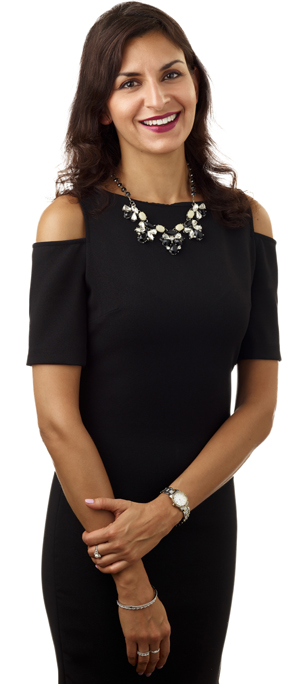 Shantona Chaudhury, BCL/LLB’05, is a founding partner at Pape Chaudhury in Toronto with a lively practice in appellate advocacy. She’s served as counsel in over 30 appeals and has successfully pleaded in front of the Supreme Court of Canada.
Shantona Chaudhury, BCL/LLB’05, is a founding partner at Pape Chaudhury in Toronto with a lively practice in appellate advocacy. She’s served as counsel in over 30 appeals and has successfully pleaded in front of the Supreme Court of Canada.
Yet Chaudhury hadn’t always dreamt of being a litigator: “It happened by accident!” she says amusedly. “I completed a master’s degree in French literature at Queen’s, but although I enjoyed studying archaic eighteenth-century literature, I decided to go to law school and do something a bit more practical.”
As a McGill Law student, Shantona Chaudhury was a founding member of Actus Reus, the Faculty’s theatre troupe, and figured her performance skills would translate to success in mooting. “I took on the Sopinka Cup in second year, without having ever taken Trial Advocacy or Procedure courses,” she says. “I ended up hiding in the library with the trial advocacy textbook to prepare!”
While she may have underestimated the workload involved in preparing for the mooting competition, the experience sparked Chaudhury’s interest in litigation. She went on to do a student clerkship in her last year of law school at the Quebec Court of Appeal with former McGill Law professor Justice Yves-Marie Morissette, and then clerked for Justice Ian Binnie, LLD’01, at the Supreme Court of Canada before launching her career as a litigator.
The challenges of appellate litigation
Chaudhury was drawn to litigation by a desire to make a difference and to help others. “With litigation, you can see how your advocacy affects peoples’ lives in an immediate way,” she says. As an appeals specialist, she is presented with challenging cases: “You don’t usually hire a specialized appellate lawyer if you don’t have a difficult case. There’s no other way to put it – it’s hard work! A good lawyer doesn’t find a strong answer quickly, and I go down many rabbit holes to consider all the angles and arguments that could work.”
However, the challenges and stress are worth it: “It’s incredibly satisfying when, after torturing myself over the details of the case, putting in hours of work, and losing sleep, I have an ‘Aha!’ moment and find an argument that I believe will work.” Chaudhury’s practice does not focus ona particular subject matter, which she enjoys: “I’m learning every single day,” she says. “In the past year, I’ve argued appeals on fertility law, reversionary class action settlements, informed consent to medical treatment,, adverse possession/prescriptive easements and the doctrine of ‘lost modern grant’, school bus accidents, and historical sexual abuse by a former priest. It’s really interesting because it requires a lot of curiosity while teaching yourself to be an expert in the subject of a particular case.”
Supreme Court of Canada advocacy
To date, the most exciting moment of Chaudhury’s career came while pleading in front of the Supreme Court of Canada. “I was only sixth-year lawyer at the time,” she says. “I usually don’t get nervous when I argue, but that time, I was terrified!” The case, involving a class-action settlement implemented by three separate provinces, required Chaudhury to understand legislation from common law and civil law traditions. Despite practicing in Toronto, Chaudhury’s McGill training had given her a strong grasp of both systems, and she was able to recite – and explain – Quebec legislation by heart: “It was the most transsystemic moment of my career!”
Now, Chaudhury helps counsel from across the country prepare to plead before Canada’s highest court as the co-executive director of the Supreme Court Advocacy Institute. Chaudhury explains that arguing at the Supreme Court is different from arguing before appellate courts, but that few appellate lawyers appear before the Supreme Court of Canada with any regularity. “The idea behind the Supreme Court Advocacy Institute was to help everyone: the court, pleading counsel, and the law as well. Given that the cases brought to the Supreme Court are of great importance, we need advocacy at the Supreme Court of Canada to be of the highest quality.”
Helping the next generation
Chaudhury is also passionate about helping the next generation of the legal profession, and takes great pride in mentoring young lawyers who are in the early stages of their careers. “Being a lawyer is so different from being a law student,” she notes. “It’s so exciting to witness young lawyers’ professional growth. You can see that they have been strategizing and thinking about the effects their decisions will have on others. They begin to think about the case as not just a legal problem, but as a person’s problem.”
Currently, Chaudhury is adapting to the changes in the legal profession brought on by the COVID-19 pandemic. “It’s a real change of rhythm, and it makes you reflect on the fast pace we usually live with,” she says. “This will be a time for the courts to take step back and reflect on how to adjust to the digital age. Although there are many issues that come with digital proceedings, this experience is showing us how things can still get done, even in suboptimal circumstances.”
Despite the challenges ahead, Chaudhury is optimistic that these difficult times will have the silver lining of improving access to justice in the long term: “Hopefully, we will wake up to a brighter world after this.”
Interview: Sarah Huzarski.
Photo: Matthew Plexman.
